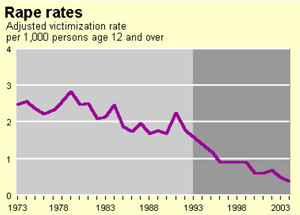 For years, anti-porn activists have campaigned against porn on the basis that it increases acts of violence against women. In essence, they say that porn causes rape.
For years, anti-porn activists have campaigned against porn on the basis that it increases acts of violence against women. In essence, they say that porn causes rape.
Today I thought I might sit down and compile a few resources that refute that claim. Because as far as I’m aware, there is still no reliable evidence to suggest that watching pornography induces men to rape.
I think the biggest piece of evidence against the claim is self evident. In the last 15 years, internet pornography has become freely available to anyone who wishes to view it. Yet there has been no substantial increase in the rape rate in that time. Indeed, US government statistics reveal that in that time, the rate of forcible rate dropped steadily. If the “porn causes rape” claim were true, we would have seen an increase in sexual assault rates. Obviously that is a very simplistic argument but it’s one that anti-porn people need to deal with. And they don’t.
Advertisement

Support independent, ethically made, award-winning porn. Bright Desire features all of my erotic films and writing. A membership to Bright Desire gets you access to every movie I've ever made and lets me keep making female friendly porn!
Click here to find out more.
-------------------------------------------------------
One of the more interesting academic articles dealing with this issue is by Anthony D’Amato from Northwestern University School of Law. His paper Porn Up, Rape Down discusses the idea that there was an 85% reduction in sexual violence over the 25 years to 2003 (and the rate has kept falling since the paper was published). He goes on to posit that not only does porn NOT cause rape, he suggests that it may actually reduce rape, either by serving as a release valve or by demystifying sex. He concedes that the correlation does not equal causality and suggests further research.
A similar 2006 paper by Todd Kendall entitled Pornography, Rape and the Internet points out that rape rates decreased in US states where the internet was rapidly taken up. Interestingly, the growth in internet use had no effect on the rates of other crimes. Slate summed up the research in an article How The Web Prevents Rape. The Register also covers the topic here.
An earlier, pre-internet paper looked at rape rates in countries that had legalised porn and came to similar conclusions. Pornography, Sex Crime and Public Policy by Berl Kutchinsky was published in 1991. He writes:
The aggregate data on rape and other violent or sexual offences from four countries where pornography, including aggressive varieties, has become widely and easily available during the period we have dealt with would seem to exclude, beyond any reasonable doubt, that this availability has had any detrimental effects in the form of increased sexual violence.
Our knowledge about the contents, the uses and the users of pornography suggests that pornography does not represent a blueprint for rape, but is essentially an aphrodisiac, that is, food for the sexual fantasy of persons – mostly males- who like to masturbate
It should also be noted that this same conclusion was reached by Richard Nixon’s first inquiry into porn in 1970. Anthony D’Amato writes about working on the commission in his “Porn Up, Rape Down” paper. He says:
The Commission [on Obscenity and Pornography] concluded that there was no causal relationship between exposure to sexually explicit materials and delinquent or criminal behavior. The President was furious when he learned of the conclusion. Later President Reagan tried the same thing, except unlike his predecessor he packed the Commission with persons who passed his ideological litmus test. (Small wonder that I was not asked to participate.) This time, Reagan’s Commission on Pornography reached the approved result: that there does exist a causal relationship between pornography and violent sex crimes.
It’s not scientific to reach a conclusion and then set out to find data that backs your case, ignoring contradictory information. That is ideology, not research.
If anti-porn activists can give me real evidence that porn does cause rape, I’ll change my mind. But at this stage, based on the simple fact of dropping rape rates, I’m not seeing it.
One more link and quote to finish this post: a summary article from Scientific American which looked at various studies into porn and found that it was not harmful.
Contrary to what many people believe, recent research shows that moderate pornography consumption does not make users more aggressive, promote sexism or harm relationships. If anything, some researchers suggest, exposure to pornography might make some people less likely to commit sexual crimes.
The most common concern about pornography is that it indirectly hurts women by encouraging sexism, raising sexual expectations and thereby harming relationships. Some people worry that it might even incite violence against women. The data, however, do not support these claims. “There’s absolutely no evidence that pornography does anything negative,” says Milton Diamond, director of the Pacific Center for Sex and Society at the University of Hawaii at Manoa. “It’s a moral issue, not a factual issue.”
PS. Even though the sample was far too small, this 2 year Canadian study of men’s porn surfing habits does provide some illumination as to the real reasons why men watch porn. What it does make clear is that porn is clearly only fantasy and that men are easily able to distinguish between porn and real life.